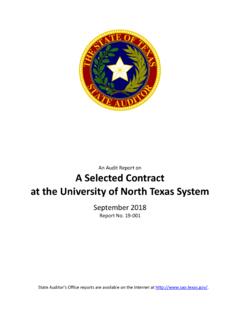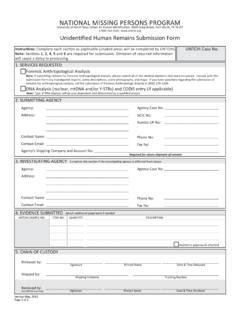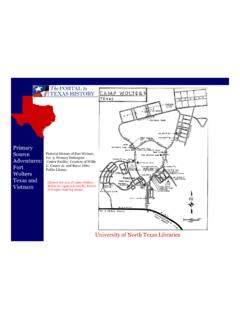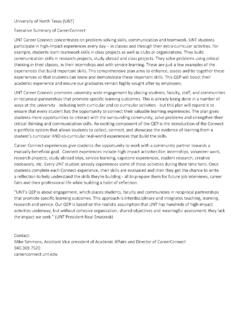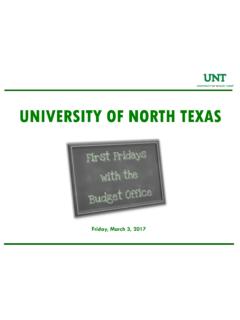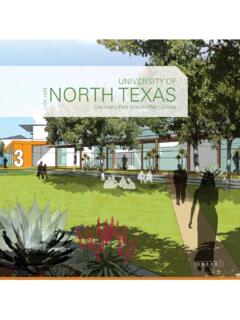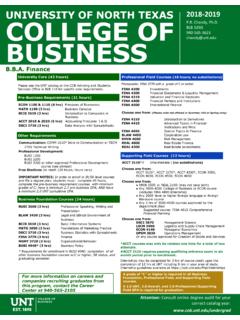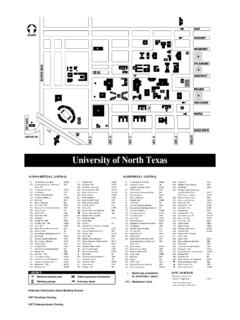Transcription of Policies of the University of North Texas - policy.unt.edu
1 1 Policies of the University of North Texas Chapter 05 Human Resources Working Hours and Flexible Work Arrangements Policy Statement. The University of North Texas endeavors to foster a work environment that maximizes productivity and flexibility for supervisors and staff. The University allows flexible work arrangements, at the discretion of supervisors, to enable employees to serve customers, meet institutional and departmental goals, and balance professional and personal responsibilities. Flexible work arrangements may be implemented as a means of achieving administrative efficiency, improving productivity and job performance, supporting business continuity plans, and supporting the hiring and retention of a highly competent workforce through work/life balance. A flexible work arrangement is a privilege and not a right. The availability of flexible work arrangements is not intended to change a department s regular hours of operation, nor does it alter the responsibility or diminish the authority of supervisors to establish and adjust work schedules.
2 Application of Policy. Staff employees. This policy does not apply to faculty positions or positions that require student status as a condition of employment. Definitions 1. Alternate Work Location. Alternate Work Location means an approved work site other than the employee s regularly assigned place of employment where official University business is performed. Such locations may include, but are not limited to, an employee s home. 2. Compressed Workweek. Compressed Workweek means an arrangement that enables employees to work extended daily hours in order to take a portion of a day or a full day off during the work period. For example: a. The "4-10" (or "4-40") work week (4 days at 10 hours per day) b. The "4-9-4" work week (4 days at 9 hours per day, and one 4-hour day) 3. Flexible Work Arrangement. Flexible Work Arrangement means an arrangement that allows a regular staff member to work a schedule other than the standard full-time workweek.
3 4. Flexible Work Schedule. Flexible Work Schedule means a work schedule that allows employees to work hours other than the normal operating hours of the University . For example: 2 a. 7:00 to 3:30 Monday-Friday (with a 30-minute lunch) b. 9:00 to 6:00 Monday-Friday (with an hour lunch) c. 7:00 to 4:00 Monday-Friday (with an hour lunch) 5. Hours Worked. Hours Worked means all time spent by a staff member that is primarily for the benefit of the University and is controlled or directed by the University . Such time includes: a. Required on duty, b. Time which an employee is permitted to work, even if not requested or required, c. Waiting, idle time, rest periods, or other breaks of short duration (from five minutes to about twenty minutes), d. Time spent traveling on official business, or e. Time spent in training directed or approved by the supervisor. 6. Regularly Assigned Place of Employment. Regularly Assigned Place of Employment means the location where an employee usually and customarily reports for work.
4 7. Remote Working. Remote Working means the performance of normal work duties at a location away from an employee s regularly assigned place of employment. This off- site location is most often the employee s home. 8. Staff Employee. Staff Employee means an employee, other than a faculty employee, who is scheduled to work at least 20 hours per week for a period of at least months and is not employed in a position for which the employee is required to be a student as a condition of the employment. 9. Standard Full-Time Workweek. Standard Full-time Workweek means a workweek no less than 40 hours. The normal office hours for the University are 8:00 to 5:00 , Monday through Friday. Procedures and Responsibilities I. This policy is not intended to address the occasional or sporadic scheduling incidences within a workweek, but to address long-term arrangements where a flexible schedule or working from a remote location is requested and approved according to policy.
5 II. Office Hours. A normal workweek begins at 12:01 Sunday and ends at midnight the following Saturday. State law sets the minimum workweek for regular full-time salaried employees at 40 hours. The workday of personnel may be staggered; however, administrative offices will be open from 8:00 to 5:00 each weekday, Monday through Friday, except on designated holidays. Offices shall remain open during the noon hours each working day with at least one person on duty to accept calls, receive visitors, or 3 transact business. Service department personnel and certain special groups may be subject to different office hours and schedules, including standby schedules, due to the nature of their work. III. Requirements A. The flexible work arrangement shall not alter the employee s obligation to observe all University rules, Policies (including but not limited to the outside employment policy), and procedures, unless expressly altered by this policy.
6 B. Eligibility. Flexible Work Arrangements, including flex work schedule and alternate work location, may be available to employees whose job functions and work history support such an assignment. Supervisors are responsible for determining eligibility. 1. Eligibility for participation in a Flexible Work Arrangement is based upon an assessment by the supervisor that the employee can continue to fully meet all job responsibilities and performance expectations, and work performance can be evaluated based on measurable outcomes. 2. The supervisor is responsible for determining the best use of a flexible work arrangement, considering the impact on work effectiveness, efficiency and productivity. C. Flexible work arrangements may be changed at any time at the discretion of the University . The University should, but is not required to provide five business days notice of changes in flexible work arrangements.
7 D. Individual work schedules must meet departmental operating and service needs. Specifically, flexible work arrangements and schedules shall be developed and administered in a way that allows the department to remain open during normal University hours. E. When working remotely, employees are expected to work their regularly scheduled hours. Overtime must be approved in advance. Departments must ensure office coverage during normal office hours. F. Working remotely is not intended to serve as a substitute for child or adult care. However, working remotely could be a valuable tool to individuals with caregiving responsibilities, provided that their productivity or quality of work is not compromised. G. Remote-work is not a substitute for leave, including Family Medical Leave (FMLA). An employee may be allowed to work from home when on Family Medical Leave if the employee has been approved for intermittent or reduced work schedule leave and the employee can perform the essential and marginal functions of the position as indicated in the employee s medical certification.
8 4 H. Supervisors and employees are required to complete training related to developing and managing flexible work arrangements to ensure understanding of mutual responsibilities. Employees must complete training prior to submitting a flexible work arrangement request form, and supervisors must complete training prior to acting on a request. I. Approval and Evaluation. The decision to approve or deny a flexible work arrangement is at the sole discretion of the University and is not subject to the grievance procedure. This policy establishes minimum approvals for Flexible Work Arrangements below; however, a Vice President may establish a process requiring additional approvals for their division. Supervisors are responsible for knowing and understanding the approval procedures for their division. 1. Remote Work Arrangements. The supervisor, department head or dean, if not the supervisor, and appropriate Vice President must approve Remote Work Arrangements.
9 2. All Other Flexible Work Arrangements. The supervisor and department head or dean will approve or deny all other Flexible Work Arrangement requests. IV. Timekeeping A. All employees who have a flexible work arrangement including remote working, may be required to submit weekly time reports as well as any other records related to hours worked required by the supervisor. Failure to provide records in a timely manner, when requested, may result in disciplinary action. B. Lunch Periods. Full-time staff members may take a maximum of one hour for a lunch period, depending on their assigned work schedule. C. Rest Periods. Supervisors may allow full-time staff members to take up to two fifteen-minute rest periods during the regular workday. Supervisors may also allow part-time employees scheduled to work four hours to receive one fifteen-minute rest period. All rest periods are at the approval of the supervisor. D. Each staff member must observe the regular work schedule for the designated work location or be subject to disciplinary action.
10 V. Infrastructure Support and Property Damages Employees are personally responsible for all costs associated with a Flexible Work Arrangement, including equipment and services ( internet, computer, telephone, printer, etc.) and utilities. The University will not reimburse or compensate employees for use or maintenance of, or damage to personal property or services associated with a Flexible Work Arrangement. All remote work must comply with UNT and UNT System information security requirements. 5 VI. Workplace Injury The University is not responsible for injury at the alternate work location to any other person who would not be in the work area if the duties were being performed at the regular place of employment. Employees injured while working remotely must notify their supervisor immediately and complete all requested documents regarding any injury in accordance with UNT Policy (Workers Compensation Insurance). VII. Termination of Flexible Work Arrangements Flexible work arrangements may be terminated by either the employee or the University at any time for failure to comply with the terms of the Flexible Work Arrangement Guidelines or University Policies , or for diminishment in performance while participating in a flexible work arrangement, even if the diminishment does not warrant disciplinary or corrective action.

